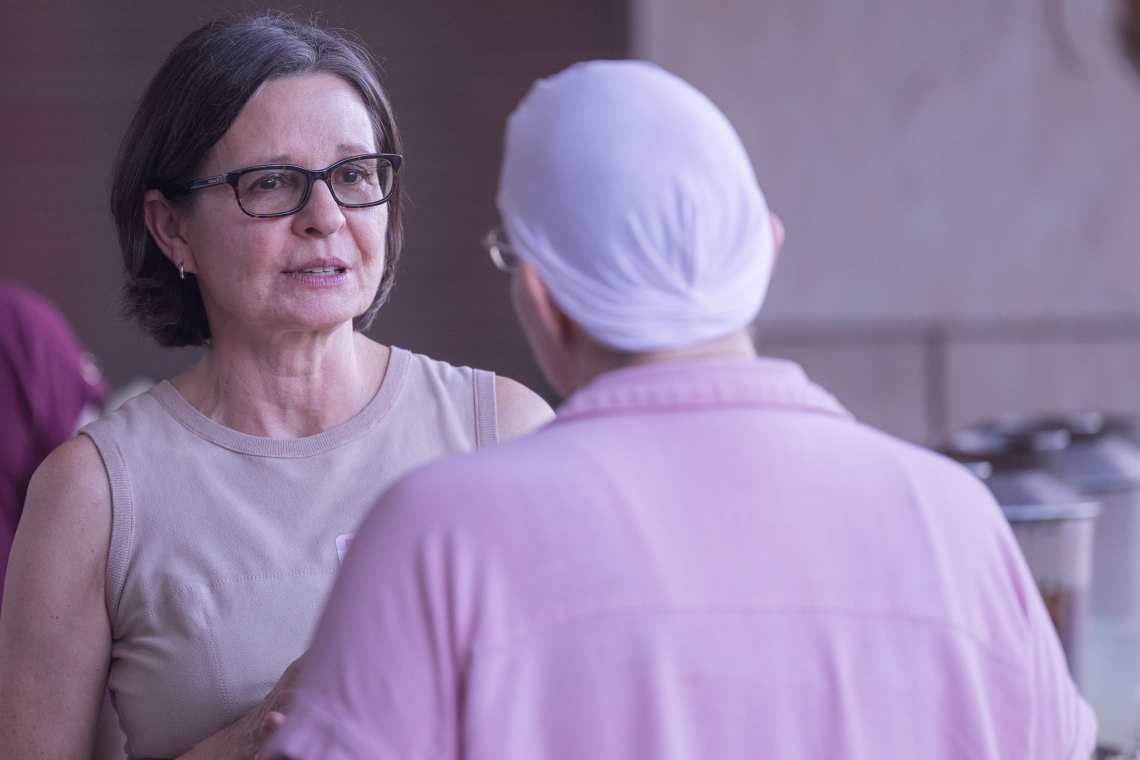New breast cancer surgery: precise, targeted, preserving healthy tissue

Dr. Nova Foster, medical director of the Breast Program in the Department of Surgery, speaks with an attendee of the Cancer Center Beauty+Bubbly event on Oct. 5, 2023.
“Personalized treatment is really the fundamental building block of doing the best possible breast cancer treatment for any patient.”
–Dr. Nova Foster
Every week, all the doctors at the Breast Program at Banner–University Medicine across specialties—the surgical oncologist, medical oncologist, radiation oncologist, radiologist, pathologist and ancillary support services—get together for what they call a weekly multidisciplinary treatment conference.
“During that meeting, we review each individual patient with a new breast cancer diagnosis.” said Nova Foster, MD, FACS. “We look at their pathology and imaging slides together, we discuss their diagnosis and general health as well as any anticipated barriers to care. We put everything together and as a team collaborate to determine the best treatment approach for that particular patient before we even start treatment.”
As the medical director for Breast Program at Banner–University Medicine and a surgeon, Dr. Foster said that multidisciplinary care is key to their treatment plan.
“As a part of a National Comprehensive Cancer Center, patients get the benefit of the whole spectrum, from basic science research, all the way through phase three clinical trials, and then moving into standard of care clinical practice,” she said. “It's a process, and having everything in the same place under the same roof helps improve our treatment of breast cancer, and in particular our care of that individual patient.”
Advances in breast cancer surgery improves patient outcomes
Dr. Foster said that over the last 20 years, breast cancer outcomes have improved substantially primarily due to successful clinical trials which have improved early detection as well as identified new effective drugs and novel surgical techniques. She noted that over the last few years breast cancer surgery in particular has transformed to be less aggressive and more precise.
“We now have innovative options such as a nipple sparing mastectomy, which is performed through a cosmetic incision often hidden below the breast,” she said. “You can perform the cancer surgery but leave all of the normal skin, in some cases including the nipple, and really give these women a fabulous cosmetic result that is so important to survivorship and their ongoing life after breast cancer.”
Other surgical innovations relate to management of the lymph nodes in the underarm, which is the first place that breast cancer typically spreads when it leaves the breast.
“Traditionally, we thought we needed to clear out a lot of those lymph nodes to optimize outcome for these patients,” she said. “Through research and clinical trials, we have learned that we can do much less aggressive surgery on the lymph nodes and have the same oncologic outcome. This leaves patients with normal function and minimizes the chance of swelling of the arm that can happen after a more extensive underarm surgery.”
Dr. Foster said that at the core of the latest breast cancer research is the understanding that breast cancer really is not one disease but many different diseases. She said that patients have different genetic risk factors, immune systems, environmental exposures, lifetime exposures to estrogen, and unique health issues.
“Personalized treatment is really the funadamental building block of doing the best possible breast cancer treatment for any patient,” she said. “But as we learn more, as we do more research, as we discover more drugs, or learn more about which drugs work better in which situations and for which patients, it will continue to allow us to tailor the care that we provide to patients in even a more personal way.”

